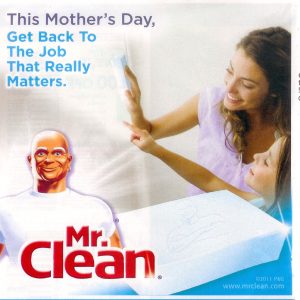
The print advertisement for Procter & Gamble’s all purpose cleaning agent Mr.Clean is problematic in a number of ways. By marketing their cleaning products to women via an image of a mother and daughter cleaning a window, the advertisement reinforces the notion that domestic jobs such as cleaning the house are a woman’s responsibility. As such, they perpetuate normative gender roles that dictate what jobs are appropriate based on gender. While Procter & Gamble try to stress the value of domestic work, jobs that are considered feminine tend to nevertheless be undervalued and in some contexts, considered demeaning in society. Their motivation for claiming that domestic work “really matters”, may not be to increase the value of feminized work, but rather to increase their market share and boost their bottom line. The slogan also insinuates that women should “get back” to domestic labour rather than pursuing careers in waged work. Mr. Clean’s portrayal as supervising the mother and her daughter as they clean the window, is an authoritative image and one that suggests male dominance and/or control over women. The inclusion of the young girl (daughter) in the image and the subsequent notion that she is being taught how to clean, further emphasises that mother’s should pass down the domestic responsibilities to their daughters. In this way gender norms are perpetuated not just laterally but generationally as well.
Due to our levels of consumption and constant exposure to corporate images and advertising, our behaviour and internalized values tend be heavily influenced by those dictated to us in advertisements. Media platforms have in the past dictated and continue to set the societal norms especially with respect to gender roles. This is a problem in that it furthers the domination of hyperfemininity and toxic masculinity as cultural gender ideals. Just one of the expectations of women according to this paradigm is that they engage in feminized labour despite there being no monetary compensation for this category of work. As such it is imperative that we as consumers engage in critical consumption as well as pressure corporations to subvert negative gender stereotyping. This is what my culture jam will seek to address by expressing the fact that jobs are not inherently gendered.
